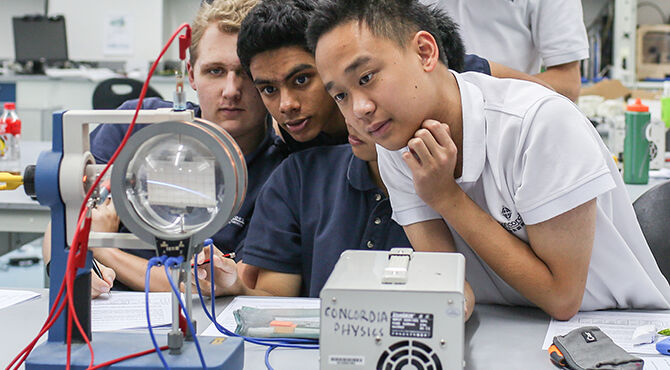A future of unlimited opportunities: preparing students
The next generation of global citizens will face many new challenges in a rapidly shifting political landscape. How are international schools preparing their students to face an uncertain future?

Developing the next generation of leaders
Young graduates are aware that expectations of new recruits are higher than ever before, and that the international skills that are demanded of employees are evolving fast. But forward-thinking young people with an eye on a globally mobile career may face ever-more-complex challenges as they try to negotiate a growing culture of cynicism and fear of globalisation.“There is a tremendous friction between the forces of globalisation and a large number of people for whom that globalisation doesn’t spell opportunity, possibility or progress, but loss, uncertainty and anxiety,” observed Professor Gianpiero Petriglieri, associate professor of organisational behaviour at international business school INSEAD, speaking at the 2016 annual conference of the CIPD, the professional body for HR and people development.“It is very important not to underestimate it. But I don’t think it is, as some people say, a failure of globalisation. It is a failure of leadership, of leaders’ ability to distribute the value created by globalisation in a fair and humane way.”Interestingly, while children of parents making an international move may find the upheaval and change of school unsettling, education experts suggest that the international-mindedness and cultural agility that naturally follow a successful global relocation and international education can help to develop the skills required to bridge this gap, particularly when it comes to empathising with the needs of different nationalities and cultures.David Porritt, former headteacher of the British School in the Netherlands Junior School Leidschenveen campus, in The Hague, believes that students at international schools are at a distinct advantage. “International schools are unique environments creating important reflections of the wider world in which we live,” he says.“There is a rich tapestry of variation and cultural expression amongst the students themselves. Watching multilingual, multi-aware and multinational students working together with humility, respect and tolerance is truly inspiring. There is always so much to learn from one another.“Our challenge and responsibility is to develop the next generation of ethically and morally responsible leaders. It is what underpins all of the activities that students get involved in. It’s what we, and they, do all day.”Christopher Schuster, high-school principal of Concordia, an international private Christian school in Shanghai’s Pudong district, agrees. “International students often use their ability to understand complex systems and heightened sense of empathy to fuel passions centred on global development and social entrepreneurship,” he says.“They believe that they can, simultaneously, be successful and make the world a better place, because their educational experiences have exposed them to countless examples of amazing people doing those very things.“This gives international students an advantage when it comes to understanding complex systems and solving complex problems. International students are exposed to education-based travel, often exposing them to poverty and geographically isolated cultures. These experiences help to develop empathy at a young age and create globally minded citizens.”“Knowledge is changing quickly, and the ways of making a living are changing even more rapidly,” explains Hugh Burke, headmaster of Meadowridge, an independent International Baccalaureate World School in British Columbia, Canada. “We understand that we live in a rapidly changing world, a world that is increasingly global, increasingly intercultural, increasingly complex and increasingly interdependent. The ability to work with others is central to future success and happiness, and the others with whom we will live come from every culture, and from around the world.”
Benefits of an international curriculum
One of the most popular options for families when relocating with children is to find a place in an international school teaching either the curriculum of their home country or an international curriculum such as the International Baccalaureate (IB), owing to the ease of transition and the international transferability of the learning programmes offered.David Hanna, director of university counselling at The York School, a coeducational independent school in the heart of Toronto, believes that, in an IB school, the competencies required if young people are to succeed in global business are fundamental, and are lived and taught as part of everyday life.“International-mindedness is an attitude, not just a programme,” says Mr Hanna. “IB schools are particularly skilled at instilling this mindset amongst their learners. International-mindedness is more than flags, food and festivals. The truly internationally minded learner understands that there can be multiple truths, respects a variety of viewpoints, and critically contributes to an open discussion of issues.”Erin Woodhams, director of admissions and marketing at the British International School of Chicago, part of the Nord Anglia Education group, believes that “enabling our students to build relationships with a diverse group will prepare them for their journey beyond school. On top of the global-mindedness our students acquire, an international-school setting prioritises community connections between students, parents and the local culture.“Ultimately, it seems that families want their children to see their world as bigger than their local city and to someday find themselves studying, working or living in many different locations. For many, their understanding of the world will begin with their international school.”Terrie Ademi, strategic marketing manager at Berlin Brandenburg International School, an IB World School in Kleinmachnow, Germany, would go even further. She suggests that the IB curriculum offers some answers to the complex questions that are being asked in the wake of recent political upheavals.“Less than ever before are we in a position to make predictions about the future,” Ms Ademi says. “Parents are therefore worried about the future of their children. What is the firm ground that can be the basis for a happy and successful life for the next generation? Is the new local, the new patriotism, or even nationalism an answer to protect us from the storms of globalisation?“International schools strongly believe that this will not work. Limiting opportunities will not increase chances.“Intercultural competences and critical thinking are key to learning in international schools, and, if they use IB curricula, even more so, as the IB learner profile describes the curious, resilient and still empathic type of person who is so much needed.“While knowledge remains important, information and data can be drawn from online sources everywhere. But even more key are skills, attitudes and the readiness for action – and maintaining curiosity, because things keep moving. Once a question is answered, we move on to the next one.”
Developing a sense of belonging for leaders operating across borders
INSEAD’s Professor Gianpiero Petriglieri believes it will be vital in the coming years for leaders operating across national borders to find some commonality.“It isn’t enough to look the same way or be from the same place,” he says. “You have to find what we have in common. You have to build what we have in common with words and facts. These days, you might not belong geographically – fine. What other way can you claim belonging? It might be attachment to a community, a set of values, some specific place. But there is a sense in which they are able to say, ‘Yes, I do move around, yes, I do have this variety of experiences, but this is where I belong. In some way or other, we belong together’.“If you reach the point where you are trying to lead a group of people and cannot credibly say in some way, shape or form, ‘We belong together’, you are not going to lead. You cannot lead if you do not belong.”Harry Lynch, head of school at Newman Boston, a coeducational private school in Boston’s Back Bay district, believes that experiencing the challenges of an international curriculum gives students a sense of belonging to a community that extends beyond their immediate experience. “When students realise that they are being asked to perform the same tasks and meet the same level of challenges that their peers around the world are undertaking, they are not intimidated, they are energised,” he says.Indeed, many students in an international-school setting are offered the opportunity to be surrounded by peers from various nations, who contribute to the learning environment with the flavour of their heritage.“We don’t talk about understanding between cultures, we live it every day; being different is the norm at an international school,” says Berlin Brandenburg’s Terrie Ademi. “Our students, in implicit and explicit ways, acquire intercultural skills; how to use body language differently and what subjects are appropriate to talk about are topics of daily life.”Global mobility as a lifestyle: producing a new kind of leader
Young people who have experienced the globally mobile lifestyle from an early age are well poised to take advantage of the needs of the evolving global business world, and are likely to offer a new kind of leadership.“In contemporary organisations, especially large ones, you have to be mobile to become a leader,” says Gianpiero Petriglieri. “You wouldn’t advise anyone asking how they can progress in their career to stick to one place, whether that place is an office, a city, or a function.“We know from research, and from experience, that there are huge benefits to mobility. It enhances your opportunities, expands your networks, and has cultural and psychological benefits, too. It opens your mind.”At Newman Boston, Harry Lynch believes that, through participation in an international-school environment, students’ perspectives are shaped and changed. “These changes are not due to any single factor, whether the fact that they make friends from around the world or the presence of an international curriculum like IB,” he says.“Rather, through immersing themselves in an environment of friends and teachers with broad experiences, of studies that permit them to explore widely diverse perspectives, students gain greater confidence in themselves and are consequently eager to undertake challenges – in their chosen fields of study but also in life – which respond to their widened perspectives.”What schools teaching international students seem to have in common is a level of adaptability and flexibility to meet the needs of an evolving global marketplace – skills that will become vital in complex and ambiguous times.“In the end,” says David Porritt, former headteacher of the British School in the Netherlands, “that’s one of the core purposes of international schools. There is an imperative that students not only learn what they require in the here and now, but also learn to be open to new, emergent knowledge – and to be ready for an unknown future.”
Now available as an ebook on Amazon! Simply download from Amazon onto your Kindle, mobile phone or tablet to read wherever you are!
For related news and features, visit our Education & Schools section.Access hundreds of global services and suppliers in our Online Directory
 Get access to our free Global Mobility Toolkit
Get access to our free Global Mobility Toolkit  © 2017. This article first appeared in the 2017 edition of the Guide to International Education & Schools, published by Profile Locations, Spray Hill, Hastings Road, Lamberhurst, Kent TN3 8JB. All rights reserved. This publication (or any part thereof) may not be reproduced in any form without the prior written permission of Profile Locations. Profile Locations accepts no liability for the accuracy of the contents or any opinions expressed herein.
© 2017. This article first appeared in the 2017 edition of the Guide to International Education & Schools, published by Profile Locations, Spray Hill, Hastings Road, Lamberhurst, Kent TN3 8JB. All rights reserved. This publication (or any part thereof) may not be reproduced in any form without the prior written permission of Profile Locations. Profile Locations accepts no liability for the accuracy of the contents or any opinions expressed herein.




































